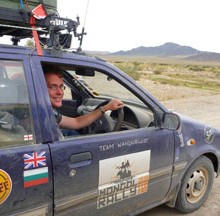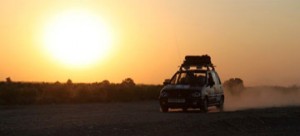By Kate Helm
Building a factory in China, earning an MBA at London Business School, and accepting a job in Copenhagen, Denmark weren’t enough. Nick Harvey ’03 wanted more. And not just any ol’ adventure, but one that would also help others.

Nick Harvey '03 drives a Perodua Nippa in Mongol Rally.
So, he and his friend, Maria Novatschkova, set out July 24 on the Mongol Rally – a 10,000-mile, 41-day journey driving a tiny car 8-12 hours per day from London to Ulaan Bataar, Mongolia. Dubbing themselves Team Wanderlust, Harvey and Novatschkova crossed 18 countries, five mountain ranges, three deserts, and the second-highest road in the world, the Pamir Highway. They used a 847cc, 72hp Malaysian car called a Perodua Nippa. They were one of 350 teams in the fund-raiser for Christina Noble Children’s Foundation, with money aiding the Blue Skies Ger Village in Ulaan Bataar for abandoned or homeless Mongolian children. They also donated the car and equipment to Adventures for Development, a Mongolian charity.
Harvey’s travels have taught him that people are people no matter where they live, a lesson illustrated by a stop in Astara, Iran, by the Caspian Sea. At a campsite in the city, a husband and wife invited the travelers back to their home.
“We arrived at midnight, and the wife woke up her two children and made us tea and cut some fresh melon,” he says. “They gave us a bedroom, prepared a breakfast of freshly baked bread, panir cheese, tomatoes, and homemade jams the next morning, and gave us a lunch to take along. They didn’t want anything in return. The Iranians were by far the friendliest people I’ve met in my travels to many countries in the world.”

Sunset in the desert along the road to Mongolia.
Listening to his father’s stories of exotic cultures inspired Harvey to work abroad after receiving his degree in chemical engineering. He went to work for a division of Houghton International and in a few years received a six-month work assignment at a customer’s location, a General Motors facility in Yantai, China. He studied Mandarin Chinese and when the contract ended, went out on his own. He and a partner built a factory to produce small cargo trailers. After three years, he decided to return to school to obtain his MBA.
Working in industry is an interest Harvey cultivated in China, where “every day was an adventure, everything was different and new.”
In June he became research and development project manager for Radiometer, a Danish subsidiary of the Danaher Corporation, which produces small sensor cassettes found inside blood gas analysis machines that measure 17 different parameters of a patient’s blood. He leads the eight-person Dispensing Process Group, which develops the manufacturing processes.
Radiometer granted him an early six-week vacation to participate in the Mongol Rally. In fact, the emphasis on the work-life balance is a refreshing change of pace for Harvey. In China, most employees actually lived at the GM factory, visiting their families only one or two times per year. In Denmark, if Harvey stays until 5 p.m., he’s often the last one in the office.
“They make up for the shorter work day by being incredibly efficient,” explains Harvey. “Lunch is rarely longer than 20 minutes, few breaks are taken, and they work quickly. They – even upper management – do this so they can get home and see their families.”
The road to success, just like the road to Ulaan Bataar, can be bumpy but he would never trade the experience. In Tajikistan, Harvey’s car got stuck in a glacial riverbed. It took his team, some of whom were suffering altitude sickness, four hours to winch it free. And Mongolian “roads” still give him nightmares.
“Mongolia’s roads are many parallel dirt tracks etched across thousands of miles of fields,” he says. “Imagine driving over thousands of consecutive speed bumps, hour after hour, day after day. The last 200 kilometers into Ulaan Bataar suddenly become smooth, paved highway. In a few hours, you go from the most empty, vast expanse of beautiful landscape you can imagine to a dirty, crowded, rundown city. You’ve just driven across a third of the surface of the earth and then you’re there. It’s actually anticlimactic.”
But for Harvey, it’s always been about the journey anyway.


1 Comment
Comments are closed.